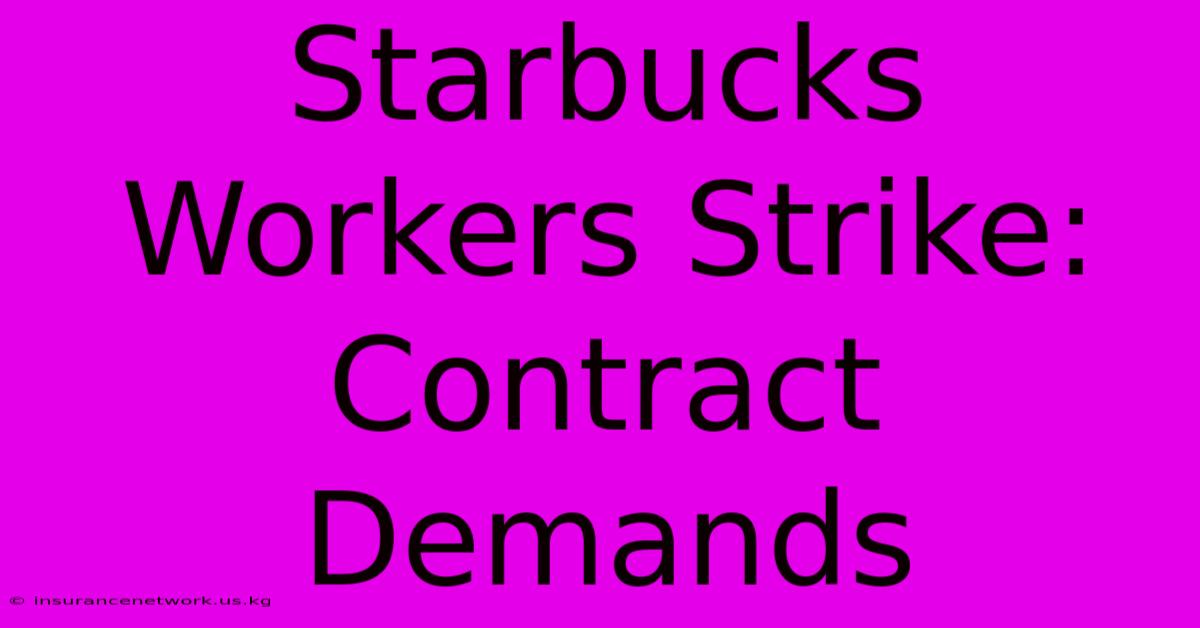Starbucks Workers Strike: Contract Demands

Discover more detailed and exciting information on our website. Click the link below to start your adventure: Visit Best Website insurancenetwork.us.kg. Don't miss out!
Table of Contents
Starbucks Workers Strike: Contract Demands Fueling Nationwide Walkouts
Starbucks workers across the nation are increasingly engaging in strikes, highlighting a growing movement demanding significant improvements to their employment conditions. These walkouts aren't isolated incidents; they represent a coordinated effort driven by unmet contract demands. This article delves into the key issues fueling these strikes and the broader implications for the coffee giant and the labor movement.
Key Contract Demands Driving the Starbucks Workers Strike
The strikes aren't simply about higher wages, although that's certainly a central component. Workers are demanding a comprehensive overhaul of their employment experience, encompassing several key areas:
1. Significant Wage Increases: A Living Wage for Baristas
A core demand consistently echoed by striking workers is a substantial increase in wages to reflect the rising cost of living. Many argue their current pay doesn't provide a living wage, forcing them to rely on public assistance or struggle to make ends meet. They're pushing for wages that genuinely allow them to afford housing, healthcare, and other essential needs in their respective communities. This isn't just about individual financial security; it's about ensuring a stable workforce capable of providing consistent, high-quality service.
2. Improved Healthcare Benefits: Addressing Affordable and Comprehensive Care
Access to affordable and comprehensive healthcare is another crucial demand. Many Starbucks workers currently lack adequate health insurance or face unaffordable premiums and deductibles. The strikes underscore the need for improved benefits packages that provide comprehensive coverage without creating an undue financial burden for employees. This is particularly important in a sector where employees are often juggling multiple jobs to make ends meet.
3. Safe Working Conditions: Prioritizing Employee Well-being
Striking workers are also raising concerns about workplace safety. This encompasses a range of issues, from understaffing leading to increased pressure and risk of injury, to a lack of adequate support for employees facing harassment or discrimination. They're demanding a safer and more supportive work environment that prioritizes employee well-being and prevents workplace hazards. A safe working environment fosters productivity and reduces employee turnover.
4. Union Recognition and Respect: Protecting Collective Bargaining Rights
A significant motivating factor behind many of these strikes is the push for stronger union recognition and respect for collective bargaining rights. Workers are demanding that Starbucks genuinely engage in good-faith negotiations and respect their right to organize without intimidation or retaliation. This is vital for ensuring fair treatment and a voice in shaping their working conditions. The fight for union recognition is central to many workers' fight for better pay, benefits, and working conditions.
5. Consistency in Scheduling and Predictable Hours
Many Starbucks workers cite unpredictable scheduling and inconsistent hours as a major source of stress and financial instability. The demand for more consistent scheduling and predictable hours aims to improve work-life balance and ensure employees can better manage their personal lives and financial obligations. This also contributes to greater employee retention.
The Broader Implications of the Starbucks Workers Strike
The Starbucks workers' strike has far-reaching implications beyond the company itself. It’s a powerful demonstration of the growing labor movement and the rising demands for better working conditions across various sectors. The outcome of these strikes will significantly impact other companies in the food service industry and could set a precedent for future labor negotiations. The success or failure of these efforts will undoubtedly influence the dynamics of the labor market and the discourse surrounding fair wages and working conditions in the United States.
The strikes highlight the need for businesses to prioritize employee well-being and invest in their workforce to ensure a sustainable and productive environment. The public response to these strikes will also play a crucial role in shaping the future of labor relations in the country.
Conclusion: A Fight for Fair Treatment and Dignity
The Starbucks workers' strike is not just about securing better pay and benefits; it's a fight for fair treatment, dignity, and the right to organize and have a voice in shaping their own working lives. The demands put forth by striking workers reflect a broader societal shift towards valuing workers’ rights and recognizing the importance of a living wage and safe working conditions. The outcome of this movement will have a significant impact on the future of work in America.

Thank you for visiting our website wich cover about Starbucks Workers Strike: Contract Demands. We hope the information provided has been useful to you. Feel free to contact us if you have any questions or need further assistance. See you next time and dont miss to bookmark.
Featured Posts
-
Nosferatus Unexpected Coziness
Dec 26, 2024
-
Taylor Swift At Pittsburgh Chiefs Game
Dec 26, 2024
-
Travis Kelce New Chiefs Td Record
Dec 26, 2024
-
Mariah Careys Christmas Hit On Netflix Nfl
Dec 26, 2024
-
Injured Doncic Leaves Timberwolves Game
Dec 26, 2024
